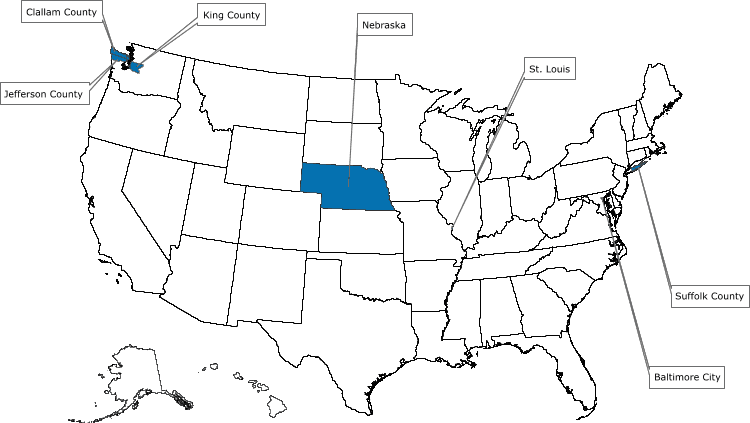
Figure. Colorectal Cancer Demonstration Screening
Sites, 2005–2008
Note: All programs provide screening and follow-up
services to low-income persons aged 50–64 years, who are underinsured or
uninsured for colorectal cancer. In addition, some programs focus on a specific demographic subgroup.
Maryland Department of Health and Mental Hygiene
- Site of the colorectal cancer screening program: Baltimore
- Service delivery network: five hospitals
- Screening test offered: primary screening with colonoscopy
Missouri Department of Health and Senior Services
- Site of the colorectal screening program: St. Louis
- Service delivery network: A specialty care health provider network, a university hospital, and federally qualified health centers
- Screening tests offered: for persons at average risk for colorectal cancer, primary screening with guaiac-based fecal occult blood test (FOBT) with colonoscopy for follow-up of positive FOBTs; for people at high risk for colorectal cancer, primary screening with colonoscopy
- Focus on African Americans
Nebraska Department of Health and Human Services
- Site of the colorectal cancer screening program: statewide
- Service delivery network: state health department and physician practices; some providers already in the National Breast and Cervical Cancer Early Detection Program
- Screening tests offered: for persons at average risk for colorectal cancer, primary screening with guaiac-based fecal occult blood test (FOBT) with colonoscopy for follow-up of positive FOBTs; for people at high risk for colorectal cancer, primary screening with colonoscopy
Public Health – Seattle & King County, Washington
- Site of the colorectal cancer screening program: King, Clallam, and Jefferson counties
- Service delivery network: primary care clinics and physician practices; some providers already in the National Breast and Cervical Cancer Early Detection Program
- Screening tests offered: for persons at average risk for colorectal cancer, primary screening with guaiac-based fecal occult blood test (FOBT) with colonoscopy for follow-up of positive FOBTs; for people at high risk for colorectal cancer, primary screening with colonoscopy
- Focus on American Indians, Alaska Natives and African Americans
Stony Brook University Medical Center/SUNY, New York
- Site of the colorectal cancer screening program: Suffolk County, New York
- Service delivery network: Stony Brook University Medical Center with referrals from clinics associated with the Suffolk County Health Department
- Screening test offered: Primary screening with colonoscopy
![]()
Volume 5: No. 2, April 2008